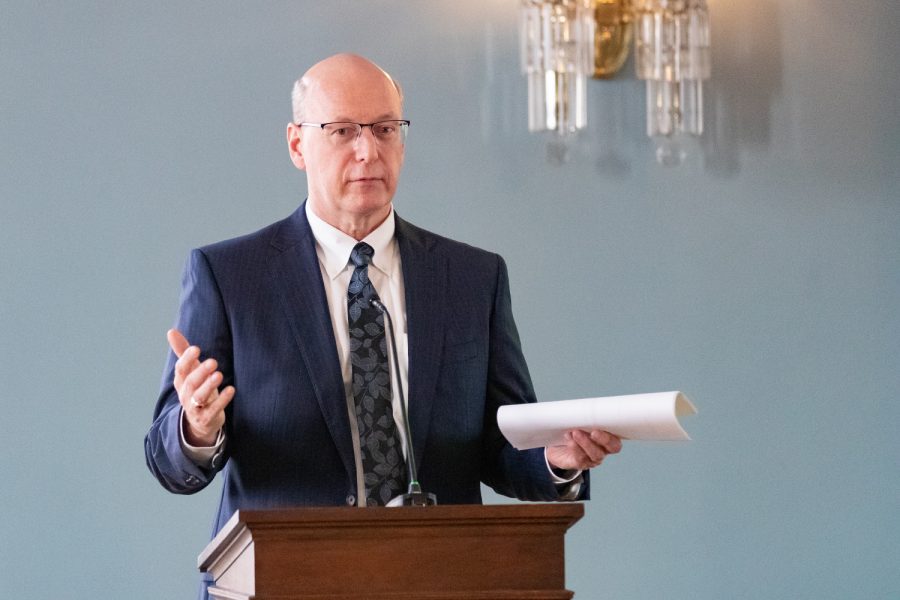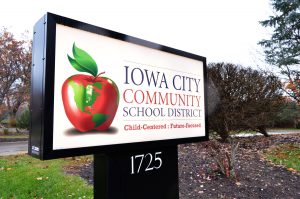UI Faculty Senate addresses potential public-private partnership
Some Faculty Senate members expressed concerns that the UI’s recent announcement of a potential public-private partnership would remain beneficial long-term.
Terry Johnson, the University of Iowa Chief Financial Officer and Treasurer, speaks at the Faculty Senate meeting on Tuesday, Feb. 12, 2019. Johnson was on hand to address a proposed public-private partnership concerning UI power generation capabilities. (David Harmantas/The Daily Iowan)
February 12, 2019
Faculty Senate members debated the pros and cons of handing over management of its utility system to a private contractor on Tuesday, contemplating the potential benefits to the institution in the agreement’s early years but how it could be detrimental to a future UI.
UI Finance and Planning kicked off the meeting with an informational presentation about their recent announcement to possibly engage in a public-private partnership involving its utility system.
UI Chief Financial Officer Terry Johnson said a public-private partnership would function to produce a revenue stream for the university that could be invested into an endowment fund to contribute to academic and research programs.
Over the next 50 years, he said the UI would pay the private organization back through financial commitments.
“I want to emphasize that this is still a work in progress,” Johnson said. “We have not committed to the idea. The sole reason for going through this process is trying to get this influx of funds that then can be reinvested back into our coalitions here at the university.”
He said the UI will continue to own its utility system and its assets, but will form a services agreement with a new operator that can manage the facilities, which will be chosen in a competitive process.
“We need to make sure this is a win-win situation,” Johnson said. “We as a public entity enter into a public relationship. We’ve invested a lot in the new budget model and will use that framework we’ve created.”
Johnson said the university will not sell its assets, forgo its commitment to the environment, or decrease accessibility to utilities for engineering research.
In addition, he said the new firm will hire roughly 80 percent of UI utility employees, and the remainder will be trained in skill sets that can lead to employment elsewhere across campus. Overall, Johnson said this plan is not a method of eliminating staff members.
RELATED: UI exploring public-private partnership for utility system
“[The firm] needs to operate and maintain the system in the way we’ve done it,” Johnson said. “It’s not like we turn over the keys to the new operator and walk away. The plant stays on our campus, and we stay engaged to ensure that they are meeting these requirements.”
He added that the responsibilities determined to be allocated to the private firm in such an agreement so far include steam, chilled water, and basic water services to the campus. Elements still up for debate include high quality water, distribution tunnels, and natural gas.
“We have a very large, complex system,” Johnson said. “The new operator will likely have a global perspective, and we want [them] to continue to explore new biofuels.”
In response to Johnson’s presentation, many Faculty Senate members raised concerns about future staff and students who might not receive the same benefits from a public-private partnership as those working or attending the university at the time it receives the endowment.
“We can’t predict exactly what will happen in the future,” Johnson said. “My work life is not anywhere close to 50 years, so I’m very concerned for making sure that we don’t collectively make a problem for our predecessors.”
Johnson admitted to having his own level of skepticism in regards to the agreement, but said he was gaining optimism by trying to model the future cost increases and their funding.
“There’s no guarantee this is a good idea,” Department of Finance Executive Officer Thomas A. Rietz said. “The financial side is the easy question to answer.”
Furthermore, while Johnson pointed towards other public institutions such as Ohio State University as a model for successful partnerships, legal analysis Professor Caroline Sheerin cited similar models that failed in the state of Indiana.
“I want to make sure we’re learning the lessons from P3’s that have just gone so badly,” Sheerin said.






